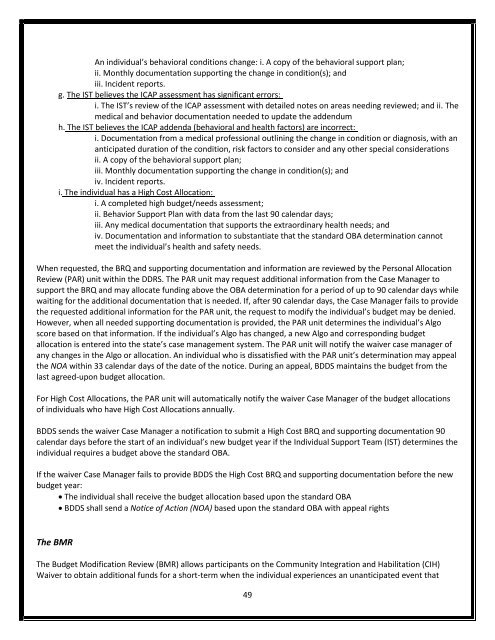DDRS Waiver Manual
2dXf5Pj
2dXf5Pj
Create successful ePaper yourself
Turn your PDF publications into a flip-book with our unique Google optimized e-Paper software.
An individual’s behavioral conditions change: i. A copy of the behavioral support plan;<br />
ii. Monthly documentation supporting the change in condition(s); and<br />
iii. Incident reports.<br />
g. The IST believes the ICAP assessment has significant errors:<br />
i. The IST’s review of the ICAP assessment with detailed notes on areas needing reviewed; and ii. The<br />
medical and behavior documentation needed to update the addendum<br />
h. The IST believes the ICAP addenda (behavioral and health factors) are incorrect:<br />
i. Documentation from a medical professional outlining the change in condition or diagnosis, with an<br />
anticipated duration of the condition, risk factors to consider and any other special considerations<br />
ii. A copy of the behavioral support plan;<br />
iii. Monthly documentation supporting the change in condition(s); and<br />
iv. Incident reports.<br />
i. The individual has a High Cost Allocation:<br />
i. A completed high budget/needs assessment;<br />
ii. Behavior Support Plan with data from the last 90 calendar days;<br />
iii. Any medical documentation that supports the extraordinary health needs; and<br />
iv. Documentation and information to substantiate that the standard OBA determination cannot<br />
meet the individual’s health and safety needs.<br />
When requested, the BRQ and supporting documentation and information are reviewed by the Personal Allocation<br />
Review (PAR) unit within the <strong>DDRS</strong>. The PAR unit may request additional information from the Case Manager to<br />
support the BRQ and may allocate funding above the OBA determination for a period of up to 90 calendar days while<br />
waiting for the additional documentation that is needed. If, after 90 calendar days, the Case Manager fails to provide<br />
the requested additional information for the PAR unit, the request to modify the individual’s budget may be denied.<br />
However, when all needed supporting documentation is provided, the PAR unit determines the individual’s Algo<br />
score based on that information. If the individual’s Algo has changed, a new Algo and corresponding budget<br />
allocation is entered into the state’s case management system. The PAR unit will notify the waiver case manager of<br />
any changes in the Algo or allocation. An individual who is dissatisfied with the PAR unit’s determination may appeal<br />
the NOA within 33 calendar days of the date of the notice. During an appeal, BDDS maintains the budget from the<br />
last agreed-upon budget allocation.<br />
For High Cost Allocations, the PAR unit will automatically notify the waiver Case Manager of the budget allocations<br />
of individuals who have High Cost Allocations annually.<br />
BDDS sends the waiver Case Manager a notification to submit a High Cost BRQ and supporting documentation 90<br />
calendar days before the start of an individual’s new budget year if the Individual Support Team (IST) determines the<br />
individual requires a budget above the standard OBA.<br />
If the waiver Case Manager fails to provide BDDS the High Cost BRQ and supporting documentation before the new<br />
budget year:<br />
The individual shall receive the budget allocation based upon the standard OBA<br />
BDDS shall send a Notice of Action (NOA) based upon the standard OBA with appeal rights<br />
The BMR<br />
The Budget Modification Review (BMR) allows participants on the Community Integration and Habilitation (CIH)<br />
<strong>Waiver</strong> to obtain additional funds for a short-term when the individual experiences an unanticipated event that<br />
49


